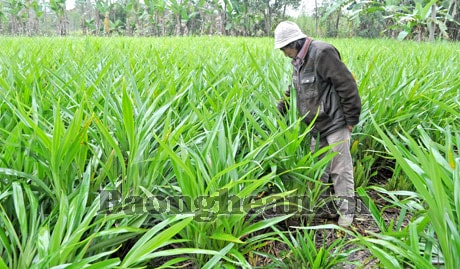Sustainable development of Quy Chau agarwood industry
(Baonghean) -Discovered by chance more than half a century ago and with only a few households experimenting, but by chance, agarwood products have taken root and become a profession with hundreds of production facilities. To this day, when talking about agarwood, we are talking about Quy Chau.
The son of Mr. Vo Le Hai (commonly known as Pho Hai) in Block 2B, Tan Lac Town, is one of the "ancestors" of the Quy Chau incense industry. He recounted: His family is one of the 7 households from Dien Chau who migrated to Quy Chau to settle down. Incense was discovered by chance around 1960, when his father, while lighting a fire to warm himself, discovered a type of dry wood that emitted a very attractive aroma. Gradually, after discovering that it was agarwood, a precious tree, he and some families paid attention to exploiting and saving it to roll incense on Tet holiday to give to friends to burn to ease homesickness. Up to now, there have been hundreds of production facilities in the district and each facility has a different secret and formula for mixing incense powder.
Over time, agarwood trees are becoming increasingly rare and expensive, so along with finding similar trees to replace them (agarwood roots), agarwood flowers today have other ingredients. In addition to incense sticks (also called chu) made from lung or bamboo and agarwood roots, there are also star anise, bagasse, cardamom, cinnamon...
According to Mr. Hai, to make the agarwood burn completely and have a beautiful circle according to spiritual beliefs, from the time of choosing the incense stick, it must be carefully and elaborately selected. As early as the second lunar month, when the bamboo and bamboo still have swallowtail leaves, they must be bought to soak; after a few months, they are taken out, processed, split into small pieces and dried, and stored until the main season to be used. Currently, due to the increasingly scarce raw materials, the children are grown up and the high labor costs, he only works on a small scale, from 300,000 to 400,000 trees per year to sell and give away.
Mr. Vuong Dinh Suu, Chairman of the Incense Association of Tan Lac Town, Quy Chau, said: After being recognized as an Incense Craft Village in 2009, this profession brings in revenue of around 15 billion VND each year, creating jobs for thousands of idle farm workers, with an income of 150,000 to 200,000 VND/person/day. Previously, incense roots - the main ingredient for making incense - were abundant in Quy Chau forest and of very good quality. However, due to overexploitation, incense roots are being depleted and must be purchased from other places. On average, each year, craft villages in the town have to spend more than 6 billion VND to buy incense roots, of which 70% are purchased from other districts.
Mr. Ho Viet Thang's 13-month-old rosewood garden (Tan Huong 2 village, Tan Lac town).
For the above reason, Mr. Ho Viet Thang in Tan Huong 2 village, Tan Lac town, after a period of producing incense, turned to research and collect native incense roots for propagation. Currently, in his garden there is about 1 hectare of incense roots ranging from 1 month to 6 months old and the oldest is 13 months old. Mr. Thang said: Incense roots are very suitable for Quy Chau soil, planted for about 2 years to harvest, the older the tree, the more valuable it is. The average yield is about 16 tons/ha. With the price of each kg of dry roots at 47 thousand VND (16 thousand VND/kg of fresh roots), the potential and economic value of incense roots is very large. Mr. Thang hopes that the State will have timely support to form an incense root material area, ensuring raw materials for production for craft villages in the area.
Also with the goal of promoting the development of the incense industry and especially becoming a brand of goods with protected origin, after establishing the Town Incense Production Association, Mr. Dau Cong Ha, Chairman of Tan Lac Incense Cooperative and owner of a large incense production facility in the town, stood up to mobilize households and carry out procedures to register the Quy Chau incense product trademark with the Intellectual Property Office. He said: Although there are hundreds of production facilities, thanks to the public address and phone number of production facilities on the packaging, a fairly healthy competition in product production has initially formed, any facility that produces quality products will survive, and will never have any inventory; on the contrary, if the products are of poor quality, they will be returned by customers and it will be very difficult to survive. However, due to limited funding and the majority of production households are small, promoting product brands and expanding the market is still difficult. Currently, in addition to the domestic market, agarwood incense has only reached the Ha Tinh market and some places in Hanoi...
The entire Quy Chau district has 7 craft villages in 5 communes and towns producing incense, of which Tan Lac town alone has 3 craft villages, 2 villages with the profession of producing incense with 98 households; on average, each year supplying millions of incense sticks to the market. To reduce costs and prices, currently, some large incense production facilities have invested in modern machinery to grind and mix incense powder, cut incense paper, diversify product designs...
According to Mr. Vuong Dinh Suu, Tan Lac Incense Association, in order for the incense craft village to develop sustainably, in addition to improving product quality, building and developing brands, one of the long-term solutions for the Quy Chau incense production profession is to proactively take the "input" initiative by planning and developing a stable raw material area, especially incense roots and other auxiliary materials. Only then can Quy Chau incense develop sustainably and exploit its advantages, create jobs, and improve people's lives.
Nguyen Hai






